

Splitting the Pie: Founding Team Equity Splits « Noam Wasserman. Let’s kick off 2006 with an issue about which I get a lot of questions (and which StatCounter reports is one of the highest-ranking Google search terms that lead people to this blog).
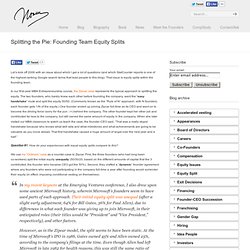
That issue is equity splits within the founding team. In our first-year MBA Entrepreneurship course, the Zipcar case represents the typical approach to splitting the equity. The two founders, who barely knew each other before founding the company, went the “easy handshake” route and split the equity 50/50. (Commonly known as the “Rule of N” approach; with N founders, each founder gets 1/N of the equity.) How to Split Startup Equity by Mike Moyer - StartupPlays. Guide Description Mike Moyer knows how to start a company.
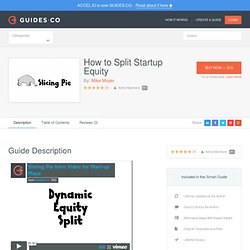
He’s had a few successful startups, but knows firsthand that equity sharing is a difficult subject to breach in the early stages. But this is when it’s most critical to leverage sweat equity as a way to fund and grow your business. Startup Equity Splits. Splitting the equity among the founders of a company may be one of the most difficult obstacles in a startup’s life.
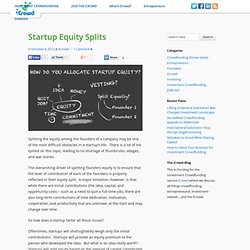
There is a lot of ink spilled on this topic, leading to no shortage of thumbrules, adages, and war stories. The overarching driver of splitting founders equity is to ensure that the level of contribution of each of the founders is properly reflected in their equity split. A major limitation, however, is that while there are initial contributions (the idea, capital, and opportunity costs – such as a need to quit a full-time job), there are also long-term contributions of time dedication, motivation, cooperation, and productivity that are unknown at the start and may change over time. So how does a startup factor all these issues? Oftentimes, startups will shortsightedly weigh only the initial contributions. Luckily, there are ways to account for this. (20) Startups: How do I design a dynamic equity split agreement with my Co-Founders.
Start-Up Equity, Founder's Shares, Dividing Up Stock, Equity Splits. While there hasn’t been much written about dynamic equity splits they are hands down the most fair way to divide up shares in a start-up company among founders, early employees, partners and anyone else that deserves a slice of the pie.
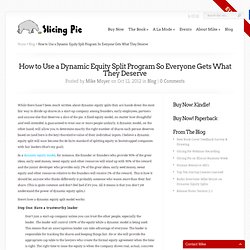
A fixed equity model, no matter how thoughtful and well-intended, is guaranteed to treat one or more people unfairly. A dynamic model, on the other hand, will allow you to determine exactly the right number of shares each person deserves based on (and here is the key) therelative value of their individual inputs.
I believe a dynamic equity split will soon become the de facto standard of splitting equity in bootstrapped companies with fair leaders (that’s my goal). Here’s how a dynamic equity spilt model works: Step One: Have a trustworthy leader Don’t join a start-up company unless you can trust the other people, especially the leader. The leader will also make sure that when a person leaves they are treated fairly. Billing. Payroll. Time Management. How Much Equity Do Your Employees Deserve? The Dynamic-Split Model Breaks It Down.
Editor’s note: Mike Moyer is the author of Slicing Pie, a book about implementing dynamic equity splits.
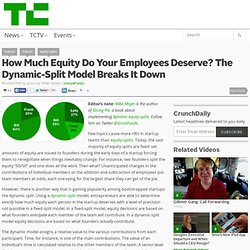
Follow him on Twitter @GruntFunds. Few topics cause more rifts in startup teams than equity splits. Today, the vast majority of equity splits are fixed: set amounts of equity are issued to founders during the early days of a startup forcing them to renegotiate when things inevitably change. For instance, two founders split the equity “50/50” and one does all the work. Then what? However, there is another way that is gaining popularity among bootstrapped startups: the dynamic split. Slicing Pie Start Up Equity. Start-Up Equity, Founder's Shares, Dividing Up Stock, Equity Splits. Grunt Glossary Fat Grunt: A person who has more than his or her fair share of the equity relative to other participants.

Grunt: a person who works in a startup doing whatever it takes to make the company a success. Grunt Hourly Resource Rate or GHRR! : the theoretical value of one person’s time relative to another person’s time. It is not an actual value, it is used to calculate an individual’s percent of the pie. Read More Grunt-Fund Friendly Lawyers Please contact me if you would like to be connected with a lawyer who understands how to implement a dynamic equity split. Read More Advisory Board Member Letter.